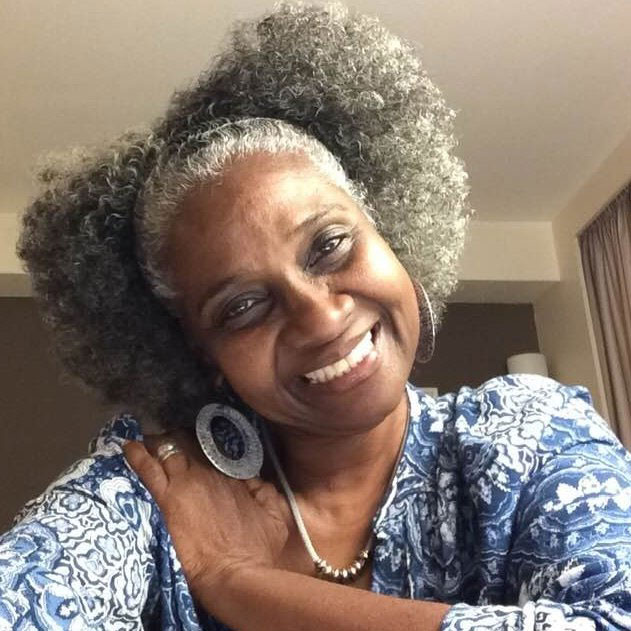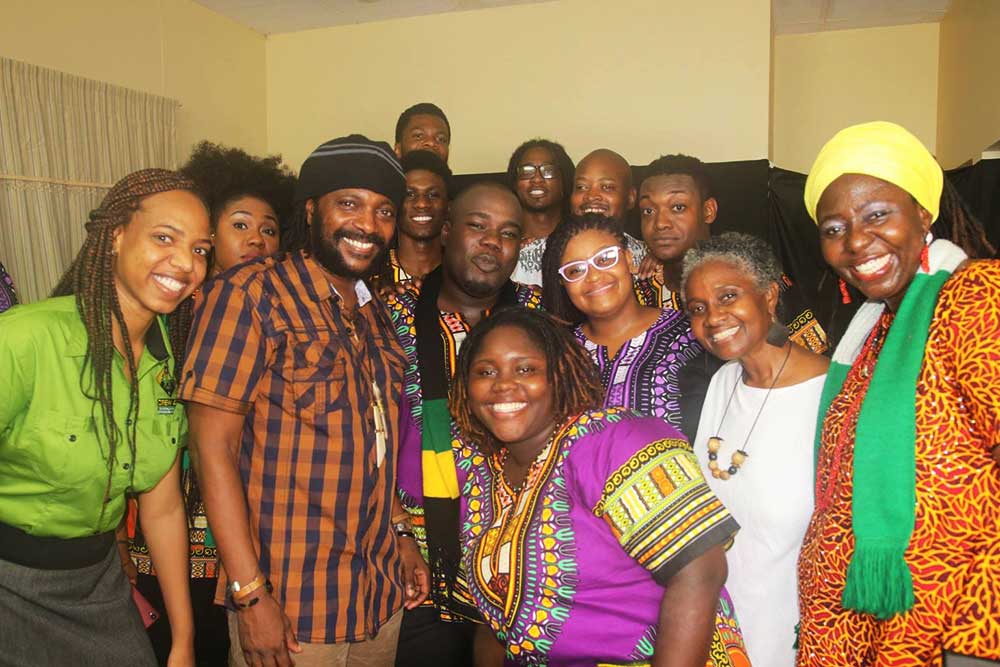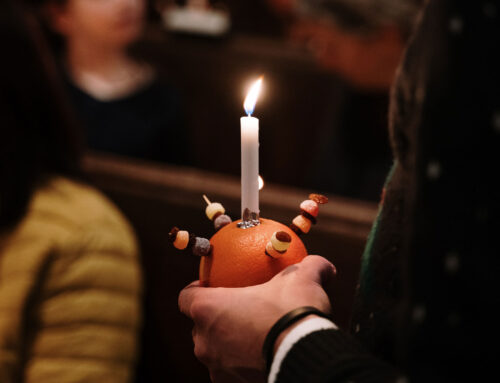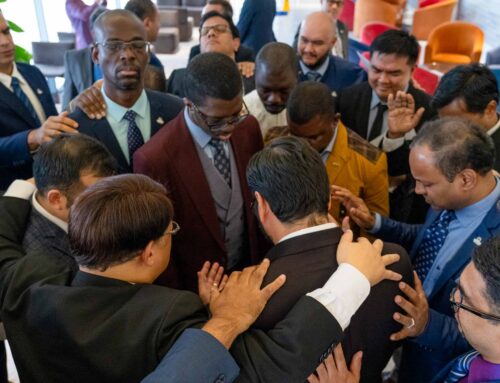A Song of Their Own
 “Come, let us sing for joy to the Lord; let us shout aloud to the Rock of our salvation.”
“Come, let us sing for joy to the Lord; let us shout aloud to the Rock of our salvation.”
In the Bible, music as a form of worship is mentioned more than 1,150 times. Musical traditions vary among cultures and languages, but music itself is a point of unification, an instinctual artistic expression of emotion too deep for words alone.
Haggai leader Jo-Ann Richards has spoken the language of music in church since she was a small child. When she attended the Haggai Leader Experience in 2000, she was a young worship leader following in her parents’ footsteps of music ministry.
“I had [a seminary degree] and thought I understood most things about being a Christian. However, I was never good at making a plan for my life.”
The Haggai Leader Experience gave Jo-Ann the vision she needed to act on God’s plan for her life. Within two years of attending her session, she left Jamaica for Burkina Faso on a mission with Wycliffe Bible Translators. The mission was to work with local church musician and help them develop a catalog of worship music using their own indigenous languages and music styles. Music is a profound expression of one’s relationship with God, and ownership over that expression, whether through language or style, is significant for a body of believers.
“Most Burkinabe music systems use a pentatonic (5-note) scale which is very different from the western scale system. As a result, simply translating the language of songs from English or French to their mother tongues would not adequately provide them with songs they can connect with on a deep level.”
The experience in Burkina Faso had a profound impact on Jo-Ann, and she soon realized that the “church music” she’d grown up with in Jamaica lacked that same depth of cultural connection she had helped facilitate while in West Africa. Jamaica was a colony of Great Britain until the 1960s, meaning that Christianity (and the accompanying music) carried a distinctly English background.

“It gradually began to dawn on me that I was helping others to have something that my own people in Jamaica didn’t have — a collection of songs for church, based on Scripture, using our own language and music genres!”
Jo-Ann returned home and got to work. The product was Kom Mek Wi, a worship album series featuring worship songs sung in Jamaican Patois, or “Jamaican Creole” and composed using the musical styles of mento, calypso, jazz, reggae, and more.
“We believe that when people overcome the negative impacts of colonization and are able to embrace who they really are, it will make a huge positive difference in how they relate to God and to each other.”
A Song of Their Own
 “Come, let us sing for joy to the Lord; let us shout aloud to the Rock of our salvation.”
“Come, let us sing for joy to the Lord; let us shout aloud to the Rock of our salvation.”
In the Bible, music as a form of worship is mentioned more than 1,150 times. Musical traditions vary among cultures and languages, but music itself is a point of unification, an instinctual artistic expression of emotion too deep for words alone.
Haggai leader Jo-Ann Richards has spoken the language of music in church since she was a small child. When she attended the Haggai Leader Experience in 2000, she was a young worship leader following in her parents’ footsteps of music ministry.
“I had [a seminary degree] and thought I understood most things about being a Christian. However, I was never good at making a plan for my life.”
The Haggai Leader Experience gave Jo-Ann the vision she needed to act on God’s plan for her life. Within two years of attending her session, she left Jamaica for Burkina Faso on a mission with Wycliffe Bible Translators. The mission was to work with local church musician and help them develop a catalog of worship music using their own indigenous languages and music styles. Music is a profound expression of one’s relationship with God, and ownership over that expression, whether through language or style, is significant for a body of believers.
“Most Burkinabe music systems use a pentatonic (5-note) scale which is very different from the western scale system. As a result, simply translating the language of songs from English or French to their mother tongues would not adequately provide them with songs they can connect with on a deep level.”
The experience in Burkina Faso had a profound impact on Jo-Ann, and she soon realized that the “church music” she’d grown up with in Jamaica lacked that same depth of cultural connection she had helped facilitate while in West Africa. Jamaica was a colony of Great Britain until the 1960s, meaning that Christianity (and the accompanying music) carried a distinctly English background.

“It gradually began to dawn on me that I was helping others to have something that my own people in Jamaica didn’t have — a collection of songs for church, based on Scripture, using our own language and music genres!”
Jo-Ann returned home and got to work. The product was Kom Mek Wi, a worship album series featuring worship songs sung in Jamaican Patois, or “Jamaican Creole” and composed using the musical styles of mento, calypso, jazz, reggae, and more.
“We believe that when people overcome the negative impacts of colonization and are able to embrace who they really are, it will make a huge positive difference in how they relate to God and to each other.”
A Song of Their Own
 “Come, let us sing for joy to the Lord; let us shout aloud to the Rock of our salvation.”
“Come, let us sing for joy to the Lord; let us shout aloud to the Rock of our salvation.”
In the Bible, music as a form of worship is mentioned more than 1,150 times. Musical traditions vary among cultures and languages, but music itself is a point of unification, an instinctual artistic expression of emotion too deep for words alone.
Haggai leader Jo-Ann Richards has spoken the language of music in church since she was a small child. When she attended the Haggai Leader Experience in 2000, she was a young worship leader following in her parents’ footsteps of music ministry.
“I had [a seminary degree] and thought I understood most things about being a Christian. However, I was never good at making a plan for my life.”
The Haggai Leader Experience gave Jo-Ann the vision she needed to act on God’s plan for her life. Within two years of attending her session, she left Jamaica for Burkina Faso on a mission with Wycliffe Bible Translators. The mission was to work with local church musician and help them develop a catalog of worship music using their own indigenous languages and music styles. Music is a profound expression of one’s relationship with God, and ownership over that expression, whether through language or style, is significant for a body of believers.
“Most Burkinabe music systems use a pentatonic (5-note) scale which is very different from the western scale system. As a result, simply translating the language of songs from English or French to their mother tongues would not adequately provide them with songs they can connect with on a deep level.”
The experience in Burkina Faso had a profound impact on Jo-Ann, and she soon realized that the “church music” she’d grown up with in Jamaica lacked that same depth of cultural connection she had helped facilitate while in West Africa. Jamaica was a colony of Great Britain until the 1960s, meaning that Christianity (and the accompanying music) carried a distinctly English background.

“It gradually began to dawn on me that I was helping others to have something that my own people in Jamaica didn’t have — a collection of songs for church, based on Scripture, using our own language and music genres!”
Jo-Ann returned home and got to work. The product was Kom Mek Wi, a worship album series featuring worship songs sung in Jamaican Patois, or “Jamaican Creole” and composed using the musical styles of mento, calypso, jazz, reggae, and more.
“We believe that when people overcome the negative impacts of colonization and are able to embrace who they really are, it will make a huge positive difference in how they relate to God and to each other.”















